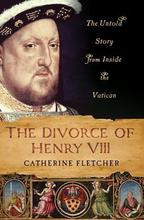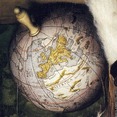Catherine Fletcher, The Divorce of Henry VIII (Palgrave, 2012) 266 pp.

Catherine Fletcher’s book, The Divorce of Henry VIII, retells the divorce of the king and Catherine of Aragon from the perspective of Gregorio Casali, Henry’s resident ambassador in Rome during the six years of the divorce negotiations, and a man virtually ignored by historians.
The research for this book has been outstanding: the archives of Bologna, Florence, Modena, Rome, Venice and the Vatican, as well as the Casali archives have been consulted. This research has led to a book which introduces us to intrigue and lobbying at the Vatican in the 1520s and 30s. Diplomacy at this time was a dangerous job; men survived on insufficient funds, in isolation and were faced with bribery and corruption on all sides. His letters were regularly intercepted, necessitating new ciphers and routes in order to get his information back to his master. Fletcher provides a good insight into the how ambassadors coped with these difficulties. Fortunately no diplomat lost his head over the affair but they did put themselves at risk: as Fletcher notes, ‘the natural hazards of disease and the multiple dangers of early modern travel caused far more untimely deaths.’
Gregorio Casali (c.1500-36), as already noted, is not a man generally known in Tudor history, yet he played an important role in the tumultuous attempts of Henry to annul his marriage to Catherine. Although the king might have sent English ambassadors to France or the Holy Roman Empire, in Rome he relied on a team of Italian clerics and professional diplomats as no Englishman on his own could understand the maze which was Italian politics and religion.
In this compulsive read we are introduced to the ambassador and his family. Casali came from a family of diplomats. No matter how effective Casali might have been as an ambassador for Henry, his main objective was the aggrandisement of his own family, the search for a wealthy wife and jobs for his brothers.
The Divorce of Henry VIII presents us with a different perspective on the annulment proceedings and the effort put in at the Roman end. Despite the hard work of this team and the inordinate sums spent in Rome, failure was inevitable. Clement VII could not annul Henry’s marriage when the Emperor, Charles V, his wife’s nephew, was about to dominate Italian politics. Moreover, Clement was a Medici and the Medici had lost Florence – only Charles could restore their lands.
Catherine Fletcher’s detective work leads the reader through a maze of intrigue, to the story of an almost unknown diplomat and his impossible mission. I thoroughly enjoyed this book and would recommend it to anyone who is interested in the cut and thrust of Tudor diplomacy and the story of men who negotiated in hazardous conditions.
Roberta Anderson
Bath Spa University


